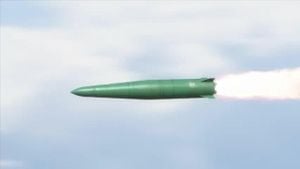Israeli airstrikes struck central Beirut early Saturday, November 23, 2024, killing at least 20 individuals and injuring over 60 others, intensifying fears and anger amid Lebanon's turbulent environment. With this pre-dawn assault, taking place around 4 am local time, Israel has escalated its offensive against Hezbollah, the Iran-backed militant group, as it attempts to dismantle its operations within Lebanese territories.
The strikes completely demolished at least one eight-storey residential building within the densely populated Basta district of the city. Local emergency services, along with volunteers, quickly mobilized to search through the rubble for survivors. The Lebanese Health Ministry confirmed the grim rise of fatalities, stating it may continue to rise as DNA tests are required for identification. Volunteers and crews have been using heavy machinery at the site as they worked against time to recover any remaining individuals from the wreckage.
Describing the devastation, Beirut resident Ali Nassar expressed his horror at the destruction endured by his city. “It was a very horrible explosion. All the windows and glasses were over me, my wife, and my children. My home now is a battlefield,” he narrated with evident distress. Nassar poignantly questioned the justification of the assault: “Should you destroy buildings where people are sleeping inside? Is it necessary to kill all the people for one person? Or we’re not humans?” His sentiments reflect the broader anguish and confusion felt by many Lebanese citizens as they grapple with the nearby violence.
This attack marks at least the fourth Israeli strike on Beirut within the span of just one week, part of Israel's broader military operations targeting Hezbollah amid the protracted conflict. Notably, the Israeli military had not provided any pre-emptive warning prior to these assaults, leading to considerable criticism about the civilian casualties and the framework of international humanitarian law which stipulates the need for effective prior notification of airstrikes.
While the Israeli military’s intentions were reportedly aimed at eliminating key Hezbollah figures, it remains unclear whether any high-ranking members were present during the time of the strike, as clarified by Hezbollah MP Amin Sherri. Israeli media has indicated the attack was potentially intending to assassinate Mohammed Haydar, another high-ranking official within Hezbollah. The chaos ensued as residents processed the explosions rocking the city.
Notably, Israel’s military campaigns have resulted not just in civilian casualties but also widespread displacement. Since September, over 1.2 million people have fled their homes due to the violence, leading to significant humanitarian concerns. The Lebanese Health Ministry indicates more than 3,670 individuals have lost their lives, with more than 15,400 injuries resulting from Israeli bombardments since the commencement of hostilities. Comparatively, Israel has reported about 90 soldier deaths and close to 50 civilian fatalities, attributing these losses primarily to Hezbollah's rocket and missile attacks.
While these tragic events unfolded, diplomatic efforts continued to address the conflict. U.S. envoy Amos Hochstein met with Lebanese officials and expressed hopes of paving the road to ceasefire negotiations. The goal is to potentially establish a ceasefire lasting 60 days, during which Israeli troops would withdraw from southern Lebanon, and concurrently Hezbollah would be required to pull back its own forces.
The humanitarian situation is becoming increasingly dire, compounded by the destruction of homes, schools, and medical facilities within the conflict zones. The World Health Organization (WHO) has reported 226 health workers and patients have perished, underscoring the urgency for international bodies to intervene and address the calamity induced by the war.
On the ground, the aftermath of bombings has ravaged infrastructure and left many homeless amid the cold approaching winter. Rescue workers and volunteers have been tirelessly digging through debris, hoping to find survivors and recover the dead, which has become routine following several bombings across the regions. The Herculean task is fraught with challenges, as many cells of residents have been left orphaned and distraught.
The need for effective humanitarian aid has far surpassed the current response capabilities. Reports indicate logistical challenges have hindered the distribution of assistance within Lebanon. Internally displaced persons face significant hurdles accessing basic needs—food, water, shelter, and medical care—deepening concerns for the well-being of civilians caught in the crossfire of these violent clashes.
International bodies have called for more effective and enforceable ceasefire agreements. Still, both Hezbollah and Israeli forces have shown signs indicating they might resist significant compromises, particularly concerning military operations across the border. Consequently, regional analysts are warning of the potential for prolonged conflict if negotiations don’t address key issues adequately.
Such cautionary forecasts are rife as citizens pay the steepest price amid geopolitical power plays. Responses from the local population remain charged with fear and frustration as many are questioning their safety, sovereignty, and the prospect of peace under bombardment. The unanswered plight is immense as civilians continue urging for restoration and negotiated understandings as the geopolitical chess game continues to play out.
Hochstein's recent diplomatic venture emphasizes the necessity of inclusive and strategic discussions. His meetings reveal the complex factors at play, including international pressure for de-escalation and simultaneous fears surrounding the resurgence of violence. Amid this uncertainty, Lebanese citizens remain on edge—uncertain of when peace might return, they aim to hold their respective governments accountable and prompt meaningful negotiations for the future they can hope for.
The entire globe watches, as the reverberations from Beirut reflect not only local frustration but also broader international concerns about stability and humanitarian rights.



